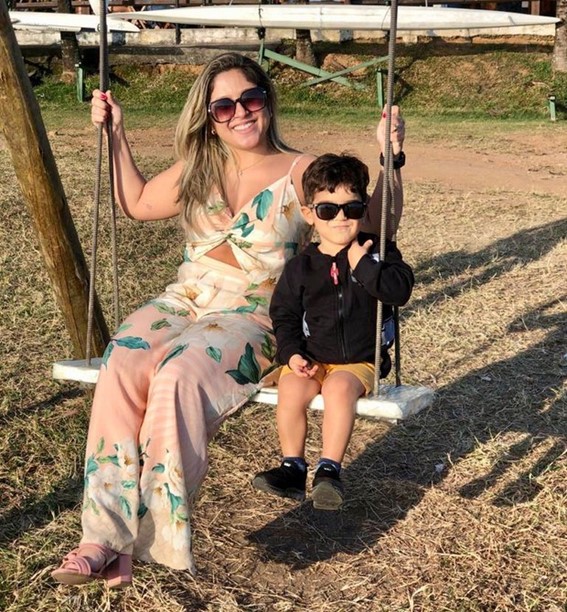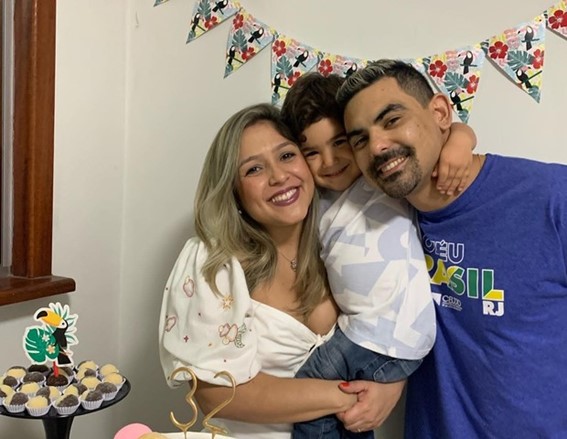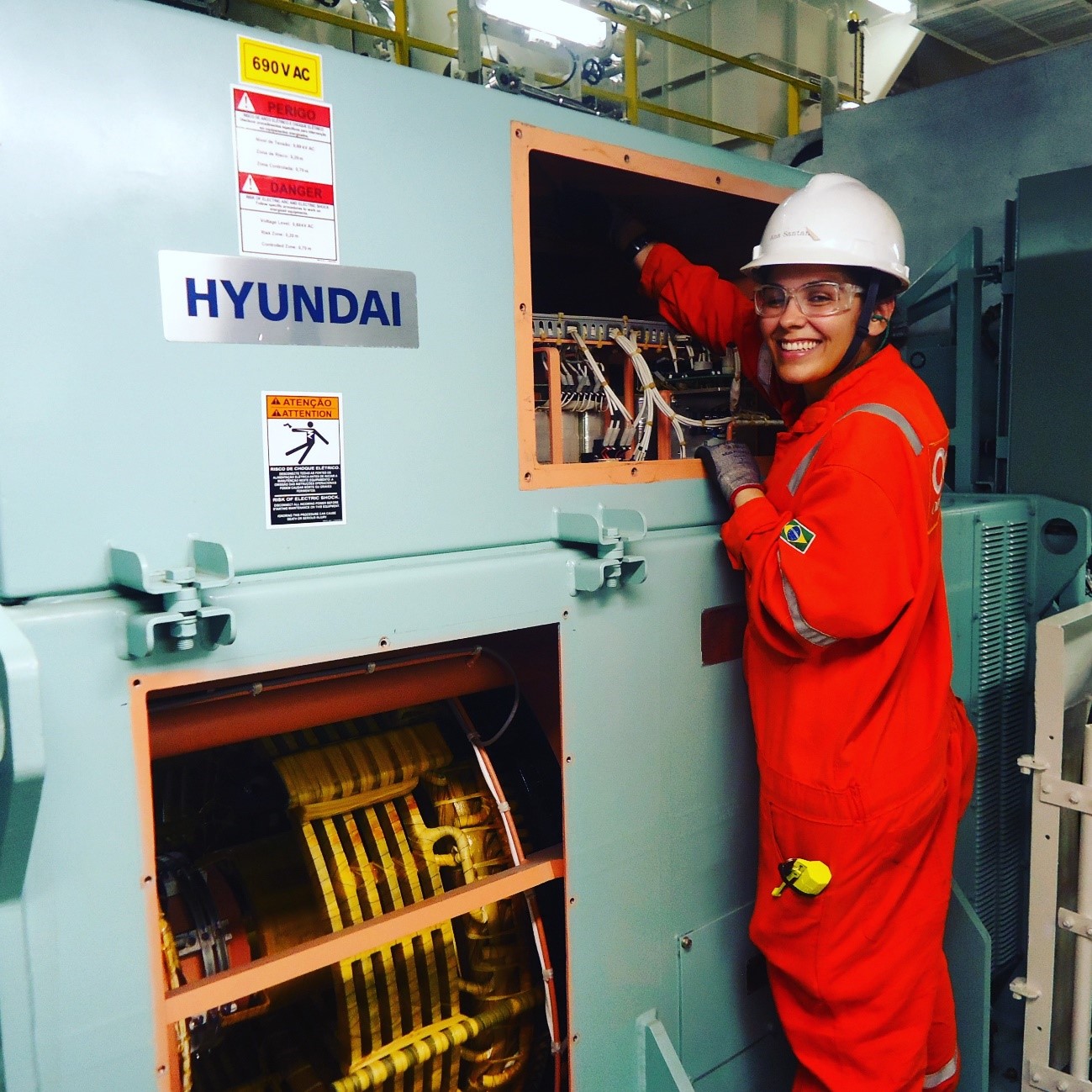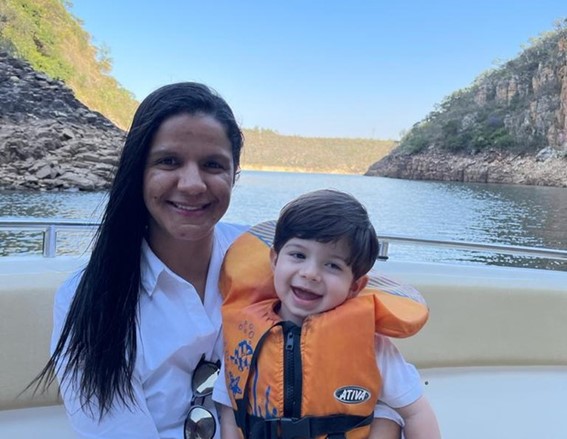OR members Ana Carolina Medrado, Gabrielle Vieira, Paulo Chaves and Rafael Santana, developed an Artificial Intelligence (AI) project that...
Get to know the reality of mothers who work at high-sea: “Every time I arrive, it’s a new child”
DATE: 10/25/2021
They spend half the month working at high-sea and the other half on leave. But distance also has its advantages: “Nowadays I have more quality time with my son,” says Rayanne Oliveira, 32, mother of Theo, 4. Learn about this and other stories, and the challenges faced by the sector in providing a more favorable environment for women, especially those who become mothers
The first job of safety technician Rayanne de Souza Gomes Oliveira, from Macaé, Rio de Janeiro, was in the offshore companies, in the oil and gas sector. “I was 22 years old, single and had no children. Still, it was a challenge. I even spent one year and three months on board,” she recalls. “Then other opportunities came up and I spent nine years working on land. Then I had my son, Theo. But when he turned 2 years old, I went back to work on board”, she says.
This time, however, reality was very different. After all, Rayane had become a mother. During an exclusive interview with CRESCER magazine, she, who spoke directly from the platform, revealed the benefits and difficulties of her routine over the last 1 year and 7 months, in which she has been working at high-sea. Check it out below:

On the left, Rayanne on board and on the right, on land, with her son Theo, 4 years old (Photo: Personal File)
“When I returned to work after maternity leave, Theo, who is now 4, was only four months old and had already gone to a full-time daycare center. At that time, I was working onshore, on a sanitation project. I would work up to 9 hours a day and stop by to pick him up from daycare. I was out all day, so I would come home tired, cook dinner, put him to bed, and tidy the house. Now I see that I didn’t have much quality time. When my phone rang with an offer to work on board again, I was a bit scared and immediately warned: ‘I have a small child. Then, later, talking to my husband and my family, we realized that the opportunity was huge and I accepted it. I focused on the positive side: offshore has the benefit of 14 days leave. It would be 14 days exclusively for Theo. So, today, I work 14 days onboard and the other 14 days I spend at home.
However, my first day on board was at the beginning of the pandemic, when the schools closed because of Covid-19. So, I found myself without daycare, everyone isolated and me far away. Luckily, I could count on the help of my mother, who stayed with him during throughout this period. At that very first time, we also had an unusual work schedule. We spent 25 days onboard. Fortunately, the company provides good internet, so we were able to make video calls. Theo doesn’t like to talk much; he doesn’t understand much yet. Some days he is fine to talk, some days he is not – and I understand. We have all even had psychological counseling to learn how to deal with these situations.
I remember that, another time, I boarded on his birthday, but we were able to celebrate beforehand. Another time, he tested positive for Covid-19, and when the news came, I was here. So, for me, it was very difficult. At the time, because of that, I disembarked and could not go home, as it always happens. My mother was with him and also got Covid. Besides the longing, there was the distance. I had to stay away for a week, even on land, at a friend’s house.

Rayanne with her son, during a break (Photo: Personal File)
I also missed some milestones in his development. It even makes me a little jealous. Each time I come home, he is a new child. But I know it is part of it, just like in any other job. Embarked or not, it would happen the same way, because, even before, I spent the day away from home. Despite all the difficulties, I know that today I have more quality time with him and this encourages me to continue. I am the daughter of a seafaring father. So, I experienced that in my childhood. When my shift ends, I go straight home. We usually spend the whole morning together, either at home or hanging out. In the afternoon, he goes to school. My husband also works offshore. Sometimes we do not see each other. In the beginning, with the pandemic, we did not see each other for almost two months. But, this year, he has been sailing less. As I have a steady schedule, we are able to plan better.
On the platform, there are shifts of 12 hours of work and 12 hours of rest. I have several responsibilities, such as evaluating the activities that will be carried out on the day, releasing documentation, performing risk analysis, meetings with the team, controlling equipment, and carrying out inspections. I still intend to work offshore for a while, mainly to better prepare myself financially. I am also attending college, I want to finish my degree and then look for a new position, but on land. It is in my plans to have more children.”

Rayanne with her son and husband (Photo: Personal File)
Traditionally male universe
Ocyan, the oil and gas company where Rayanne works, admits that the carioca is still one of the few women who choose to work onboard, especially after motherhood – today, there are about 5% women per team of, on average, 170 people on ships. However, the goal is to change this statistic and demystify the idea that there are only negative aspects for mothers who work at sea. “We understand that diversity is the way forward. We spend 14 days confined with colleagues who also have families and problems. In that environment, we realize that the woman who is a mother develops empathy in the team, she cares more for the others. We work in an environment with great risk and pressure and we need people with a ‘more human look’,” explains Ana Paula Santana, assistant probe manager and leader of the Gender Equity Affinity Group at Ocyan.
According to her, in the area, requests for layoffs usually come even before pregnancy. “Women usually have such a well-defined career plan that, even before they get pregnant, they decide to leave – precisely so that when they get pregnant, they are already onshore. But, currently, labor laws do not allow them to embark pregnant. Besides, today it takes us on average one hour by helicopter to get to the land, and there are also the risks of the tasks. Therefore, the company keeps the women ashore until the return from maternity leave,” she said. The maternity leave period is four months, but, according to Ana Paula, “we are considering increasing it”. “The return is done gradually, with a reduced workday, so that the woman feels comfortable and, at the same time, the company can meet the operation without neglecting her new needs. We understand that women will produce more if they are engaged. We work at very high risk, so the psychological needs to be right. Good performance depends on attention and carelessness can cause an accident,” she explains.

Ana Paula Santana is an assistant rig manager and also works on board (Photo: Personal File)
Mapping the profile of women
In an attempt to listen to their demands and needs, Ocyan, in partnership with the Ipsos Institute, conducted the survey “The sea is also theirs”. The objective is to draw up a profile of the offshore woman. Sixty women were interviewed, aged between 18 and 55 years old, and one of the clippings addressed the issue of motherhood. After all, 30% of them have children. Most said they have a support network (close family members, husband or nanny) to take care of the little ones while working at sea.
Among the benefits, the research revealed that:
– 50% of the women feel “very competent performing technical work”, which stimulates them on a daily basis.
– 33% emphasized the fact that they “can inspire other women to carry out this type of activity”.
– 31% stated that working a stopover allows them to better reconcile their professional and personal agenda.
Regarding the greatest difficulties:
– 24% of the women answered that “being away from the family” is the greatest difficulty of working at sea.
– 72% believe that having childcare responsibilities during the workday is more harmful to women’s careers.
– 35% said that the environment is often prejudiced.
– 45% have already thought of seeking another career.
Among those who said that they had already thought about leaving, 54% claimed that the decision is related to the work regime, which makes it difficult to reconcile career with motherhood/family. “The results brought many surprises. One ‘pleasant surprise’ was to see that most of them are happy and fulfilled at work, generating a great return for the country in terms of technology. But we also had not so positive surprises, which is where we need to pay more attention, such as investments in flexibilization to serve young mothers and also pregnant women. Family emergencies happen and, sometimes, support networks can suffer problems. We need to think about early disembarkations, for example,” Ana Paula Santana added.
According to her, this was the first formal survey to understand the offshore market, which is mostly male. “The survey will help us plan more assertive actions. We want to retain, engage and attract more women in this field. Not only mothers, but also future mothers. We saw that our company has to change, but it is no use changing alone, all the other companies in the sector need to be involved in order for the market to change”, she stated.
Multitasking professional
Clarisse Rodrigues, from Minas Gerais, who is general manager of one of the rigs, became a mother less than two years ago. Married to another woman, she says she has worked onboard for five years in countries such as Colombia, Argentina, and Mexico. And she also spent approximately three years in South Korea, involved in the construction of the rig she currently manages. “Since I returned to Brazil, 10 years ago, I have been working on land, but whenever necessary, I make shipments,” she revealed. Clarisse leads a group of 180 people who work onboard.
About her son, João, she says he was planned and desired. “My wife and I got married in 2017 and we soon started thinking and planning children. She is a businesswoman and also works a lot,” she said. The two resorted to assisted reproduction techniques to become mothers. “She fathered him with my egg. We were very lucky, because it happened on first try,” she said. To take care of the little one, the couple counts with the help of a nanny. “With the pandemic, I started working from home, so whenever possible I am with him. My wife tries to spend more time with him in the afternoon. We planned it so that it wouldn’t be too heavy for her or for me,” she said.
As a manager, Clarisse believes that the company has to provide security and shelter for women who want to be mothers. “I encourage people to have children, because it is the best thing that can happen in a person’s life. When a woman becomes a mother, she is much more adaptable to situations, becomes multitasking, starts to act with more empathy, becomes more tolerant, and is more concerned about safety. I always tell the assistants and managers not to differentiate a candidate by gender, but by competence. We have female captains, supervisors, and engineers on our rig. Companies cannot be prejudiced against women who become pregnant, and they need to be reassured that they will continue to have their jobs when they return. We still have a lot to evolve, but we have already made a lot of progress,” she concluded.

Clarisse with son, João (Photo: Personal File)


No comments